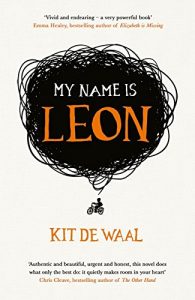I heard Kit de Waal talking to Michael Berkley on Radio 3’s Private Passions recently, having not come across her before, I was so taken with who she is and what’s she’s done that I immediately bought her debut novel, My Name is Leon, which was published in 2016. Private Passions quite often has this effect on me.
I read it in 24 hours, totally hooked and devastated by the plausible inevitability of its tragedy. Leon is the mixed race son of a totally inadequate white mother: drugs, drink, promiscuity and mental health issues. Now she has a new, white baby and Leon, aged eight, feels he has to care for them both. Of course, it goes horribly wrong. Social Services arrive and do their best. Appallingly, in time that “best” includes finding a white family to adopt baby Jake but accepting that there is “no hope” for Leon. You feel his agony, guilt, anxiety and the yearning to be with his brother, on every single page.
The interesting thing is that everyone Leon encounters – his mother’s friend upstairs, the woman who fosters him and her sister, each social worker he meets, the friends he makes at the allotments – are good people in their way although many have issues of their own. Even his mother loves him while eventually accepting that she doesn’t know why, but she can’t look after him. No one wants Leon to be unhappy. Yet from where he is standing (and eavesdropping) everyone is lying, breaking promises and letting him down – so he lies too. And steals. And truants. And vandalises. And runs away. It’s a gut wrenching story which every social worker and teacher will recognise. Eventually – no spoilers – he gets a bit of stability. It’s not perfect but it will do.
Mixed race herself, Kit de Waal’s origins are unequivocally working class. She grew up in the Irish community in Birmingham. She has served as a magistrate and on adoption panels. She knows, really knows, the world she’s writing about. That accounts for the extraordinary ring of truthfulness in this compelling novel. It’s fiction but every word of it is authentic.
The other thing which impressed me enormously is the way in which she gets into Leon’s mind. She knows what he’s thinking. She understands – and so, therefore does the reader – everything that Leon does even when, on the face of it, he appears to be rude and difficult to the people who have to deal with, and look after, him. It’s written in the third person but entirely presented from Leon’s point of view. This novel should be compulsory reading for everyone training as a social worker or wanting to. I’d insist every foster parent, teacher, magistrate, police officer and policy maker read it too.

So determined is Kit de Waal, incidentally, that working class people and those from minority backgrounds should have a voice in fiction and the world of books that, as soon as she had secured a publishing deal for My Name is Leon she launched the Kit de Waal Creative Writing Scholarship. It provides a fully funded place for a student to do the Creative Writing MA at Birkbeck. Her own achievement – getting this impressive novel published in 2016 when she was in her mid fifties – makes her a pretty powerful role model.
Next week on Susan’s Bookshelves: George Grossmith by Tony Joseph